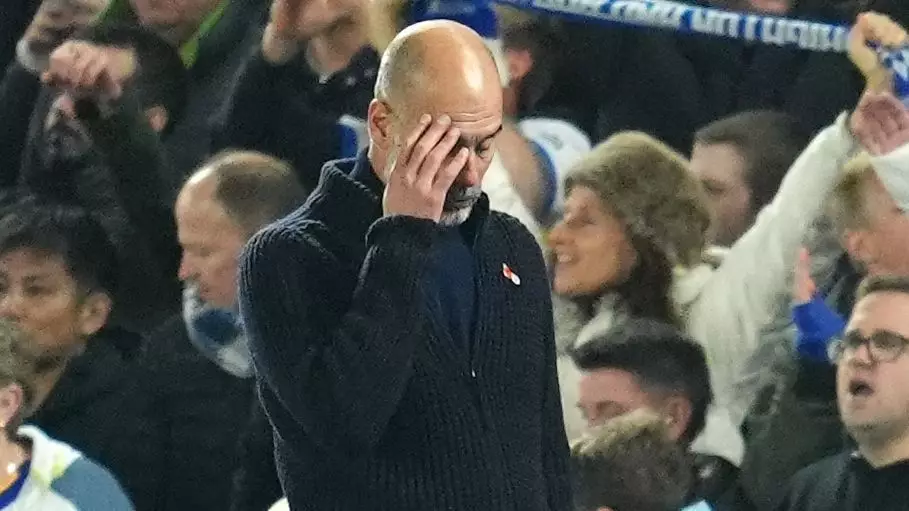In the realm of professional football, even the most celebrated managers can find themselves embroiled in a staggering decline. Pep Guardiola, often hailed as one of the sport’s greatest tacticians, currently faces the grim reality of experiencing the worst statistical run of his managerial tenure. Following their recent defeat to Brighton, Manchester City has remarkably stumbled into their fourth successive loss, a situation that was almost unfathomable given Guardiola’s prior accomplishments. This disarray has left the team languishing five points behind their Premier League rivals, Liverpool, raising questions about both the current state of the squad and the viability of Guardiola’s strategies in the short term.
Looking back at the history of Manchester City, it is notable that they have not lost four consecutive matches since 2006—before their transformational takeover by Abu Dhabi and a decade before Guardiola’s revolutionary appointment. Such context underscores the severity of the current predicament. Guardiola has never encountered a similar stretch of failures in his managerial career, which began in 2007. His past experiences, including a tough patch during his time at Bayern Munich, were characterized by fleeting moments of adversity rather than the sustained decline City is now facing. This raises the critical question: Is this the beginning of the end for Guardiola’s incredibly successful era at Manchester City?
Central to this dilemma is the injury crisis plaguing Manchester City. With star midfielder Rodri out for the season due to an ACL injury, and the absence of key defenders such as Rúben Dias, John Stones, Manuel Akanji, and Nathan Aké, Guardiola’s tactical flexibility has been severely limited. Even playmaker Kevin De Bruyne, often the linchpin of City’s attacking play, is struggling to regain form after his own injury setback. These absences have crippled the team’s performance, leaving Guardiola in a position where he is forced to rely on fringe players who may not have the experience or capability to compete at the highest level.
The Fragile Mentality of the Squad
While Guardiola remains an astute coach, the psychology of the squad also merits scrutiny. A team that previously exhibited resilience and determination now appears susceptible to mounting pressure. Despite holding an early lead against Brighton thanks to Erling Haaland’s stellar scoring ability, City failed to maintain composure during the critical phases of the match. The lack of ability to carry through the emotional and psychological aspects of the game, particularly in the second half, raises concerns about the mentality and fortitude of the players. As evident in their recent performances against Sporting and in the league, the squad’s confidence is wavering, and it’s imperative for both the players and Guardiola to address this vulnerability.
Guardiola’s Response: Desperate or Hopeful?
Faced with such adversity, Guardiola’s reactions reveal conflicting emotions. While he acknowledges the catastrophic nature of the current run, he exudes a semblance of hope, yearning for the return of key players. The genuine frustration that pervades his outlook indicates a manager grappling with the limitations imposed by injuries while still aspiring to regain some semblance of control. Yet, the repeated acknowledgment of the squad’s struggles can also appear defeatist. On the one hand, Guardiola’s comments about needing more from his players highlight a sense of responsibility; on the other, they raise concerns about whether he truly believes that the current squad can turn the tide.
Outlook: The Road Ahead
As City strives to escape this turbulent phase, a collaborative effort from both management and players is vital. The words of team captain Kyle Walker resonate strongly—as a collective, the squad must demonstrate commitment not only to the club but also to restoring the standards that have elevated Manchester City to unprecedented heights in recent years. Overcoming this slump will require not only tactical adjustments from Guardiola but a significant reinforcement of team camaraderie and a revitalization of their mental resilience.
As the season progresses, the onus is on Guardiola and his squad to navigate through this crisis. Whether this will mark a new chapter of growth or a descent into mediocrity remains to be seen. For now, the football world watches closely as Manchester City grapples with one of the most challenging periods in its recent history.

Leave a Reply